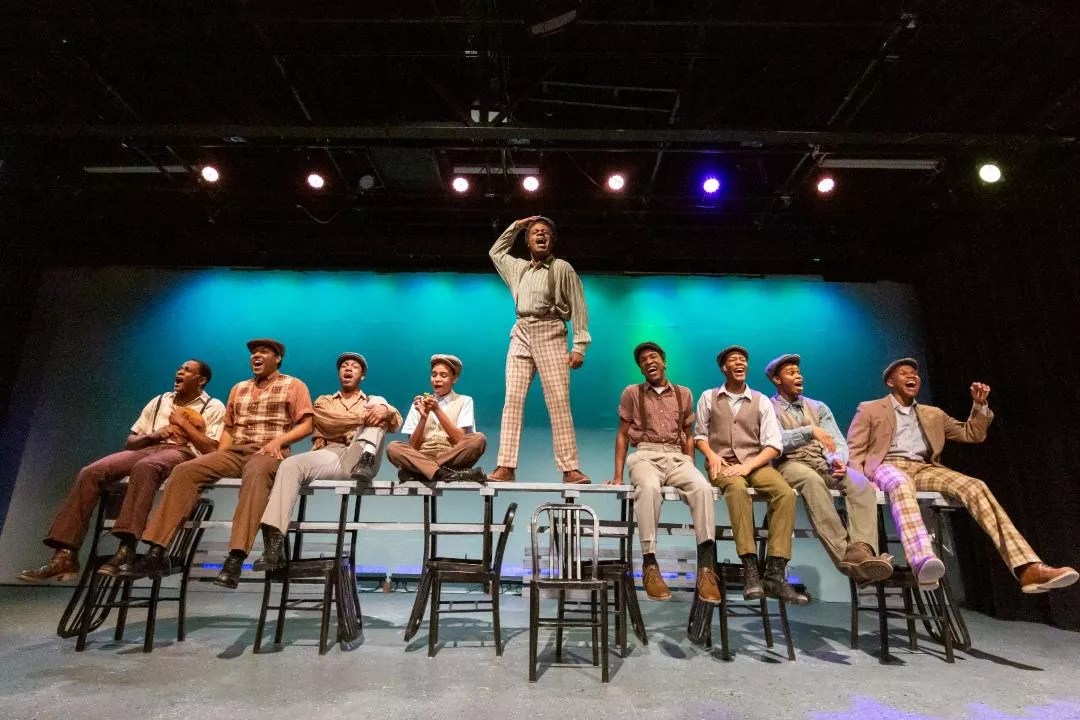
RDG Photography

Audio By Carbonatix
The Scottsboro Boys is an intense and daring musical that mingles dark and light, comedy and profound tragedy- and Vintage Theatre is giving the show a terrific Colorado premiere.
With a book by David Thompson, The Scottsboro Boys represents the last collaboration of famed songwriting duo John Kander (music) and Fred Ebb (lyrics); Ebb died before the 2010 Broadway opening. This wasn’t the first time that Kander and Ebb had melded hideous historical reality with humor, parody and toe-tapping music. Cabaret, perhaps their greatest success, wasn’t based on a specific actual event, but it depicted the decadent life of 1930s Berlin and foreshadowed what was to come. One Cabaret song, “If You Could See Her…,” was so troubling it’s been stuck in my memory since I first saw the wolfish Emcee dancing with a gorilla and singing of his love for her: “If you could see her through my eyes.” The tempo is upbeat and the gorilla hulking and clumsy. The audience laughs until the last line stops the laughter in their throats: “I understand your objection/I grant you the problem’s not small/But if you could see her through my eyes/She wouldn’t look Jewish at all.”
The Scottsboro Boys recounts an ugly chapter in 1930s Alabama. Nine black teenagers, the youngest only thirteen, were falsely accused of raping two white women. The action is presented as a minstrel show in which performers act out the event, complete with a cakewalk and a startling late-in-the-production number in blackface. Of course, the fate of those teenagers was anything but amusing. Though they somehow managed to escape execution, some remained in prison; those released were never able to resume their lives – one of them joining the Marines so that he could get a gun to shoot himself. There’s a song that reminds me painfully in tone and style of “If You Could See Her…” In this one, the two accusing women sing about “Alabama Ladies.” They’re played with brilliant faux Southern-lady delicacy by Randy Chalmers and Jayvon Rollerson – who also portray Scottsboro Boys. All of the cast members, bar one, are African-American: even the bullying sheriff and the Jewish lawyer who arrives from New York to represent the prisoners. Again, the song rendition is very funny, but the lyrics are frightening, and you can’t help remembering what an accusation of rape against a black man would almost certainly lead to in 1930s Alabama. I found myself flashing on the mutilated face of fourteen-year-old Emmett Till, murdered in Mississippi in 1955 for supposedly offending a white woman.
This is the difficult tightrope that The Scottsboro Boys has to walk. As you watch, the action becomes more and more dark – from the beginning, when you see the Boys on the roof of a train, exulting in their visions of freedom and new opportunity, to young Eugene’s terrifying prison nightmare about the “Electric Chair” – “Oh, the juice runs through you/And you start to shake/It’s a kind of tap dance/But you ain’t awake” – to the grave and troubling ending.
It takes a lot of guts for a small theater company to tackle something as fraught and demanding as this show, and director Betty Hart, along with her talented troupe of actors, has struck just the right note. All of the performances are strong – and what a pleasure to see Shadow Theatre alumnus Dwayne Carringon on the stage again in several roles. I’ve watched brief videos of the New York production, which features Susan Stroman’s flashy direction and Broadway-style choreography, and while the glitter underlines the show’s deliberate emotional ambiguity, it also detracts from its meaning. Stroman’s Scottsboro Boys flash huge smiles, charm the audience, and perform faultless splits and kicks; dancing on top of that train, they could almost be the chorus for an old-style musical like Paint Your Wagon or The Music Man. Hart and choreographer Christopher Page-Sanders take a more subdued – if equally expressive – approach to the musical numbers, and though the actors perform with skill and aplomb, they still feel like real people, folks you might know…which makes their predicament more believable and more distressing.
The production reminds us forcefully that these things really happened: lynchings attended by hundreds of gleeful viewers, townspeople posing for photos beside burned bodies, murdered men’s fingers sold as souvenirs. America sometimes seems determined to expunge the depth of this crime against humanity from its collective memory. Which – as young black people are gunned down by police and vigilantes again march through the streets with lit torches – cannot be allowed to happen.
At the end of Vintage Theatre’s The Scottsboro Boys the night I saw the production, the audience members rose to their feet as one for a standing ovation, deeply moved, but also, in some sense, exhilarated.
The Scottsboro Boys, presented through March 15 by Vintage Theatre, 1468 Dayton Street in Aurora, 303-856-7830, vintagetheatre.com.